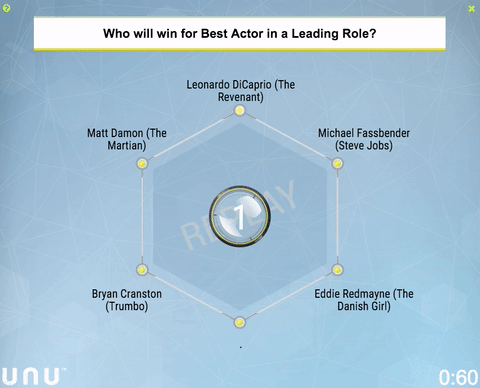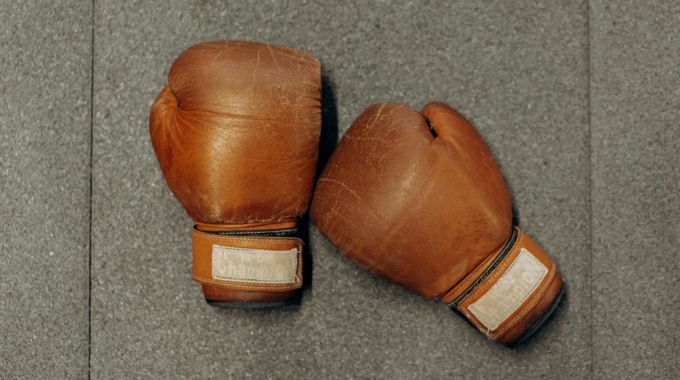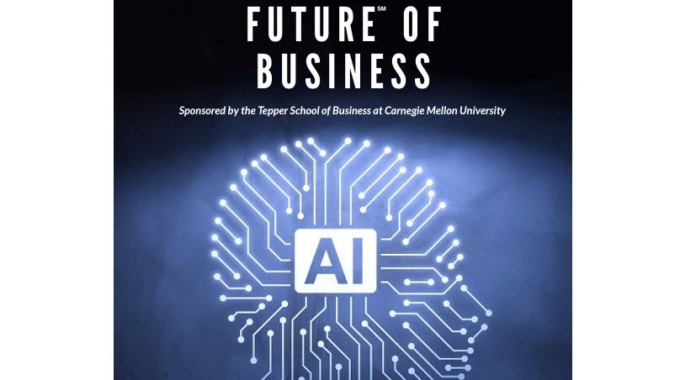On Oscar night, the brightest stars in Hollywood competed for the most coveted prize in cinema. And across the nation, industry experts and amateurs alike waged a related battle, to see who could predict the winners. This year, a new contender emerged among traditional outlets like Variety, Rolling Stone, and FiveThirtyEight. A new form of A.I. called a Swarm Intelligence gathered to predict the top 17 categories at the Oscars.
The Swarm Intelligence is known as UNU and it works by tapping the wisdom of online groups, combining their knowledge, intuition, and instincts into a single unified system that makes each prediction together, in real time. For predicting the oscars, a group of 50 movie fans, mostly voltuneers from Reddit and other online forums, formed a swarm inside of UNU and made predictions for each of the award categories.
This is what a swarm looks like when the group is working together to answer a question. Each magnet you see is controlled by a different user from around the world, all pushing and pulling on the puck at the same time:

So, how did the Swarm AI do? In short, remarkably well. The 50 average movie fans, when working together using UNU, correctly predicted the outcome of 13 of the 17 award categories.
That means a group of regular movie fans achieved 76% accuracy in picking winners by forming a swarm. So, if you wanted to know who was going to win Best Actor, Best Director, or even Best Costume Design or Best Foreign Film, all you had to do was ask UNU. (To see a complete list of UNU’s oscar picks, you can check out Newsweek, which published the UNU predictions last week).
How does that compare to the industry experts? Again, remarkably well.
- FiveThirtyEight picked only the 6 major categories, with 66.7% accuracy.
- Variety’s Tim Gray scored a 63% accuracy
- Rotten Tomatoes’ expert Matt Achity also scored 63% accuracy
- Rolling Stone’s noted film critic, Peter Travers: 63% accuracy
- USA Today’s Biran Truitt: 67% accuracy
- The LA Times’ Glenn Whipp: 63% accuracy
Maybe the better question is, who did beat UNU?
The notable exception is Variety magazine’s staff. When working together, Variety scored an impressive 14 out of 17, correctly predicting Alicia Vikander’s victory where the Swarm AI had selected Kate Winslet for an 82% accuracy rate. Of course, because Variety’s staff did better as a group than any of their individual experts, it just goes to show that thinking together truly is the best strategy.
Of course, this begs the question, what would happen if the UNU swarm was filled with experts, not regular fans? Would the swarm make predictions as a super-expert? Maybe next year, UNU will form a swarm of movie critics, with the goal of making perfect picks.
Want to try swarming? The folks at UNU are looking for beta users who want to help make predictions on topics of every kind, from Politics to League of Legends. If you want to help, please sign up here.





Pingback: Using Swarm Intelligence to Predict the Academy Awards – Crowdsourcing and Human Computation
Pingback: Let Swarm Intelligence Optimize Your Tournament Bracket - D-brief
Pingback: Let Swarm Intelligence Optimize Your Tournament Bracket – Discover Magazine (blog)
Pingback: Let Swarm Intelligence Optimize Your Tournament Bracket - AGE TIMESAGE TIMES
Pingback: March Madness: Can Big Data Prevent a Busted Bracket? - GenX i Social Buzz